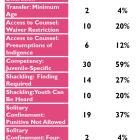Cracked Sidewalks
|
Because we have walked these streets abandoned, without a loved one as a compass to guide and point us in the right direction, we have lost our way as children.
Juvenile Justice Information Exchange (https://jjie.org/page/195/)

In late September, Torri was driving down the highway with her 11-year-old son Junior in the back seat when her phone started ringing.
It was the Hamilton County Sheriff’s deputy who worked at Junior’s middle school in Chattanooga, Tennessee. Deputy Arthur Richardson asked Torri where she was. She told him she was on the way to a family birthday dinner at LongHorn Steakhouse.
“He said, ‘Is Junior with you?’” Torri recalled.
Earlier that day, Junior had been accused by other students of making a threat against the school. When Torri had come to pick him up, she’d spoken with Richardson and with administrators, who’d told her he was allowed to return to class the next day. The principal had said she would carry out an investigation then. ProPublica and WPLN are using a nickname for Junior and not including Torri’s last name at the family’s request, to prevent him from being identifiable.
When Richardson called her in the car, Torri immediately felt uneasy. He didn’t say much before hanging up, and she thought about turning around to go home. But she kept driving. When they walked into the restaurant, Torri watched as Junior happily greeted his family.
Soon her phone rang again. It was the deputy. He said he was outside in the strip mall’s parking lot and needed to talk to Junior. Torri called Junior’s stepdad, Kevin Boyer, for extra support, putting him on speaker as she went outside to talk to Richardson. She left Junior with the family, wanting to protect her son for as long as she could ...
Because we have walked these streets abandoned, without a loved one as a compass to guide and point us in the right direction, we have lost our way as children.

“What do you do when you travel to all these places?”
I get this question a lot because judges in the traditional sense don’t travel — they sit.

The adolescent development research that underlies the latest wave of juvenile justice reform should remain the foundation for future improvements, says a new report from the MacArthur Foundation.
The MacArthur Foundation for the final time named four people as their Champions for Change within the Models for Change juvenile justice reform program.

Careful data analysis might be able to keep youth out of the juvenile justice system, a pilot study shows. Officials in Los Angeles County used a screening assessment developed by the National Council on Crime & Delinquency to identify young people in the child welfare system and direct them into prevention services.
Over the past several weeks, I have attended a number of meetings and conferences in which both juvenile justice practitioners and researchers were present. Over and over, I was reminded that these two groups really do speak in different languages and often have very different philosophies.
Tens of thousands of juveniles have been arrested by school police in San Bernardino County, California over the last decade. The arrests were so numerous that they surpassed arrests of juveniles by municipal police in some of California’s biggest cities.

Meet 24-year-old Jessica McDaniel: The woman who couldn't go without a drink before 11 in the morning is now helping other young people not make the same mistake through a peer education program for the Center for Young Adult Addiction and Recovery at Kennesaw State University in Georgia. This is the latest addition to our series The Recovery Diaries.